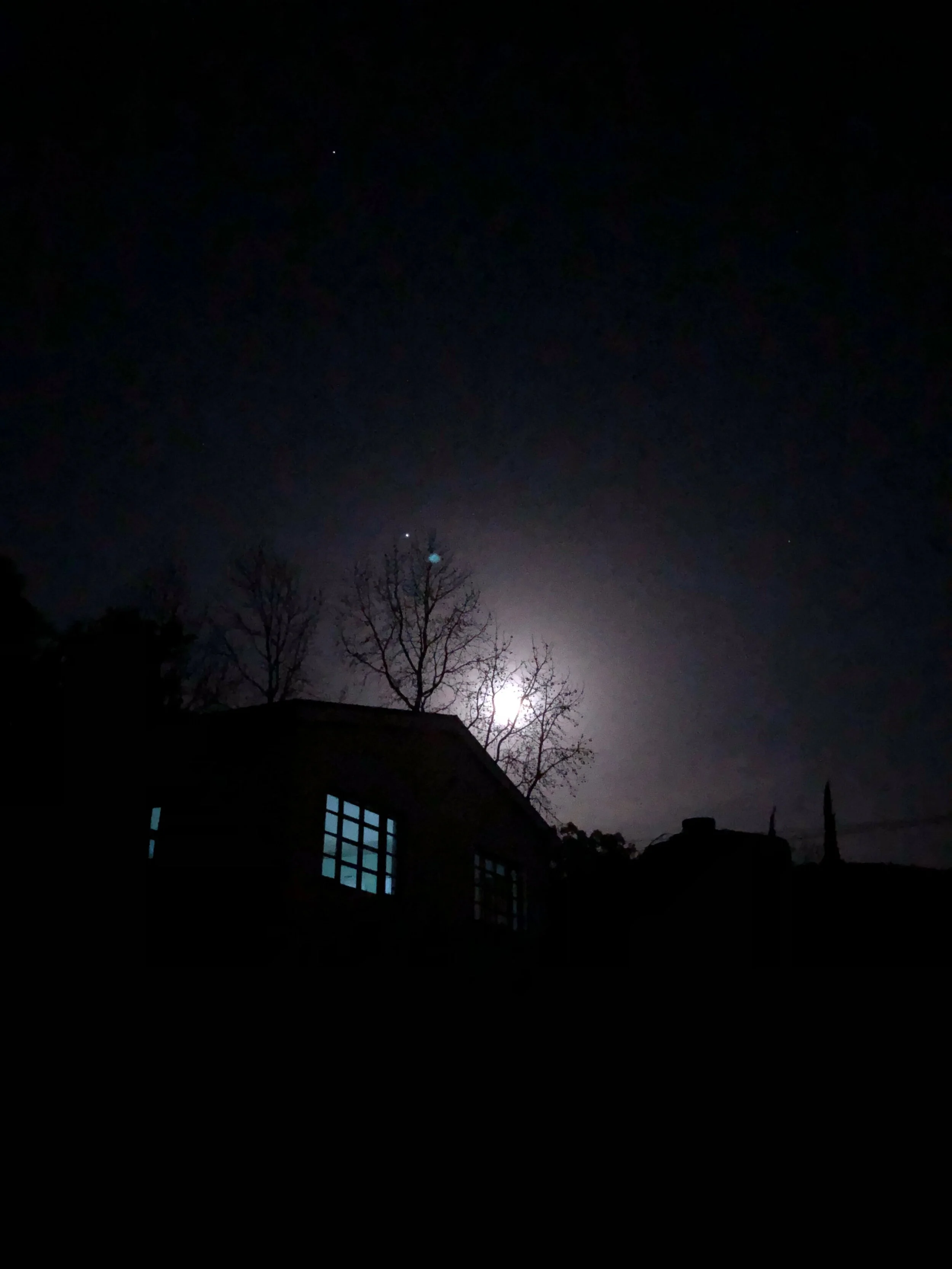Last night we had to climb through Dad’s window - twice. The first time was when I went up with his supper and glass of wine and found the door locked from the inside with the latch. It was cold outside and I shivered as I called through the window:
“Dad, can you open the door?”
“Why?” came a sleepy voice.
“So I can bring you your supper,” I answered with some hot impatience in my voice as I shifted in the starry night, balancing plates of food on both hands.
“Mmmhh,” he answered and I imagined that he turned over in his bed and carried on dozing. My demented father lives in an apartment a few metres from the kitchen back door, on a little hill separated from the main house by an outside staircase. So I took his food down to the kitchen again and got a plastic chair which I placed carefully below the window which was ajar. I stretched my leg over into the window casement - I was just tall enough - and heaved my way in and then carefully lowered myself from the sill to the floor. I could then open up, return to the kitchen and bring his dinner up and settle him. He had not locked his door in months. This was unexpected.
As I set the table, I also gave him his new medication, Donepezil. For a month we had tried him on a low dose, and as it seemed to have no serious side effects the doctor had advised doubling the dose and then monitoring his behaviour further. There seemed to be an improvement in his focus generally. Before the pills, he was managing some words but no whole thoughts. The starting words accompanied by gestures suggested thought patterns which were vanishing into thin air before he was able to utter them. Now with the pills he was managing some whole sentences which were complete in their meaning.
First thing the previous day, I had found him in his trousers without his nappy on.
“You find me in a peculiar situation,” he said, appealing to me. “Look, it’s just coming out. I am so glad you are here.” My dismay at the many puddles on the floor was mitigated by interest in his articulation. Such a speech after so many months of muddled half thoughts and words! No doubt, after this mishap his adrenaline was pumping and it must have given his synapses an extra force as he was caught with his trousers up, but no nappy on underneath to save the day.
So the new medication is proving interesting, at least in the way it is stimulating that part of his brain that produces cognitive speech. I find it hard to understand why no doctor has prescribed it before, despite his having been diagnosed with vascular dementia in 2015. After he had had a scan and an investigation by a geriatrician, I had been left with the impression that there was really nothing medically we could do for him except sedate and wait. And provide a little neural uplift with a mood enhancer which is the morning pill, also a very low dose. For those who are interested it is called Ci-Lift and half a pill a day keeps him on an even keel.
I gave him his supper, rubbed his shoulder and left, to have my dinner and family time. At 08:30pm I returned to switch off the light and check that all was well. Once more the door was locked, but now my secondary entrance, the window, was shut fast. A glowing full moon was crawling up the night sky and I could hear the frogs cackling in the bushes. I called my husband who has longer legs than mine, and he used a third window a little further from the ground to climb in and let me through to tidy up the dishes. Dad was fast asleep in his bed. While he was there, my husband unscrewed the inside bolt to prevent a further barricade from the inside.
I fear that Dad might wander and fall in the night. Once he came banging on the door at 4am to tell us angrily that he had not been fed supper, which was untrue. So we adopted a new routine, locking the door from the outside after supper, and leaving some sustenance for him to discover if he did get up between dinner and sunrise, with an appetite to sate. In the middle of the night, he rifles through the fridge and tries out left-overs including raw potatoes and turnips, seeking something to chew on. I find the discarded bits and pieces. Once I showed him an uncooked potato with teeth marks I found on the counter:
“Was this you?” I asked. “Yes,” he answered dismissively, “It’s not very good.”
His decline is slow and sure. It seems very late in the day to turn the ship around with chemicals. There is little definite about dementia, except the fact that it is opaque. I am never quite sure what I am dealing with. Maybe selfishly, I am gambling on the medication making my life as primary care-giver easier as much as it might make his more pleasant. This it would do by letting me into his thoughts a little more easily and allowing him the joy of limited communication. I carefully adapt his routines to each new step in his deterioration, and now we might have to shift gears again.
copyright Marion Edmunds, September 2021
Disclaimer: This article does not promote the use of any specific medication in any way. If you are seeking help for any medical condition, please seek advice from your doctor.
